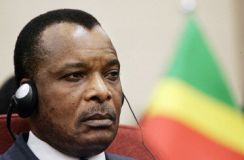Darfur talks drag on, African leaders to weigh in
May 3, 2006 (ABUJA) — Senior figures from across Africa headed for peace talks on Sudan’s devastated Darfur region on Wednesday to try to persuade rebel factions to give ground after a second deadline passed without an agreement.
 The government of Sudan has accepted a draft deal designed to end fighting that has killed tens of thousands of people. But three Darfur rebel factions refuse to sign, objecting to the proposals on security, power-sharing and wealth-sharing.
The government of Sudan has accepted a draft deal designed to end fighting that has killed tens of thousands of people. But three Darfur rebel factions refuse to sign, objecting to the proposals on security, power-sharing and wealth-sharing.
U.S. Deputy Secretary of State Robert Zoellick rushed to the talks on Tuesday, but his intensive diplomacy was unable to break the deadlock in time for a midnight deadline. African Union (AU) mediators, who had already put back the initial deadline by 48 hours, extended it again until Thursday night.
The talks, in their seventh round, have dragged on for two years while violence in Darfur has worsened.
AU Chairman Denis Sassou Nguesso, the president of Congo Republic, and AU commission head Alpha Oumar Konare were scheduled to arrive on Wednesday at the talks, which are taking place in a small hotel on the outskirts of the Nigerian capital.
In addition, several African heads of state were due to arrive for a health conference and Nigerian President Olusegun Obasanjo suggested to the AU chief mediator that they too could get involved in the Darfur talks to ratchet up the pressure.
However, diplomats said the best hope of a breakthrough rested with American efforts to engineer a trade-off of concessions on two contentious security issues.
“It’s a U.S. show. The AU mediation are spectators now,” said a Western diplomat who is closely involved in the talks.
Under a U.S. proposal, a part of the AU draft requiring the government to disarm proxy militias before the rebels lay down their weapons would be amended to suit the government better.
In return, Khartoum would accept a detailed plan for integration of specific numbers of rebel fighters into the Sudanese security forces. This is a key rebel demand.
“BROKEN RECORDS”
The rebels have a host of other demands on issues ranging from compensation for victims of the conflict to political representation for their factions in postwar institutions. Mediators say they have been uncompromising on these issues.
“Frankly some of them are like broken records. The question now is whether the Americans can get something out of the government that is good enough for (the rebels) to feel it’s worth their while,” said an African diplomat.
The rebels are split into two movements and three factions with complex internal politics and a history of infighting, making it hard for them to agree on any major decision.
The rebels took up arms in early 2003 in ethnically mixed Darfur, an arid region the size of France, over what they saw as neglect by the Arab-dominated central government.
Khartoum used militias, known as Janjaweed and drawn from Arab tribes, to crush the rebellion. The fighting has killed tens of thousands of people while a campaign of arson, looting and rape has driven more than 2 million from their homes into refugee camps in Darfur and neighbouring Chad.
Diplomats said one of the main stumbling blocks to a peace agreement was that Minni Arcua Minnawi, leader of the most powerful of the three rebel factions, was being undermined by some of his former allies because of a crisis in Chad.
Minnawi is a tribal ally of Chadian President Idriss Deby, who is battling an insurrection by fighters he accuses of fronting for Sudan. But Minnawi’s friends in Chad accuse him of abandoning Deby and selling out to Khartoum, which makes it difficult for him to sign any deal with Deby’s foes.
(Reuters)
